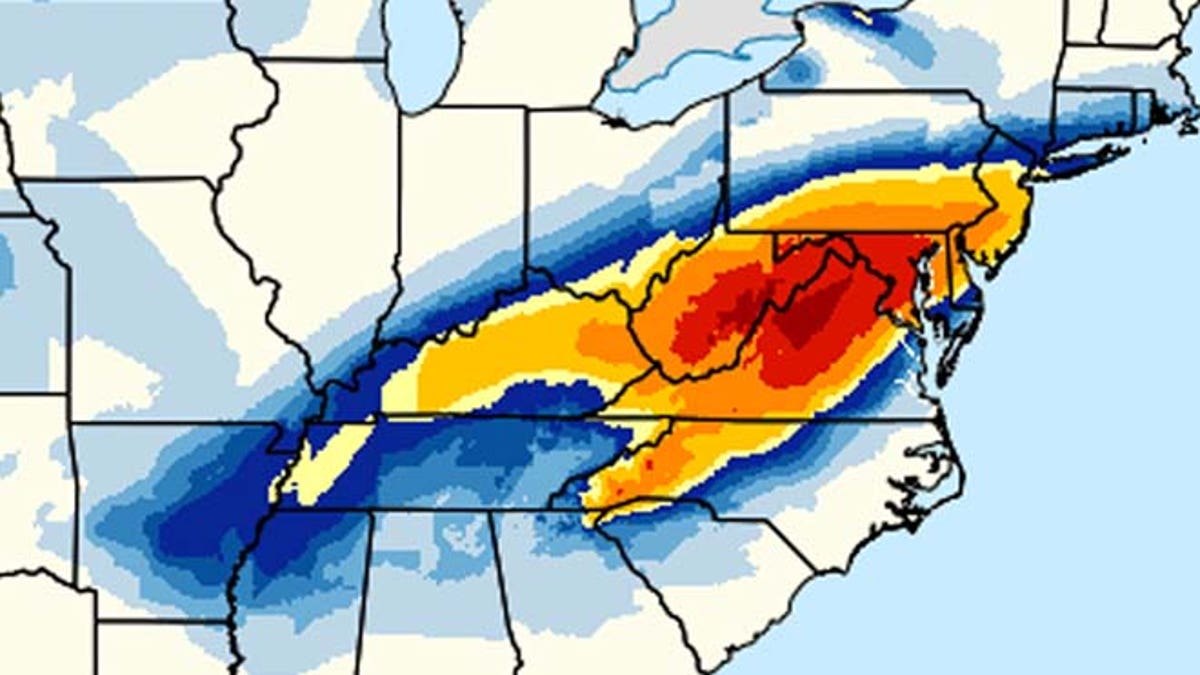
This image provided by National Oceanic and Atmospheric Administration's (NOAA) shows a computer model forecasting the chances of a snow storm hitting the East Coast this weekend, Jan. 22-23, 2016. Snow up to two feet, was forecast for areas west and southwest of the Washington, with Washington possibly getting 15 to 20 inches, Philadelphia could see 12 to 18, and New York City and Long Island could see 8 to 10, (National Oceanic and Atmospheric Administration via AP)
WASHINGTON (AP) – The blizzard menacing the Eastern United States could rank near the top 10 to ever hit the region, according to the National Weather Service.
Snowfall as heavy as 1 to 3 inches an hour could continue for 24 hours or more in the area, said meteorologist Paul Kocin with the service's Weather Prediction Center. That puts estimates at more than 2 feet for Washington, a foot to 18 inches for Philadelphia and 8 inches to a foot in New York.
Kocin compared the storm it to "Snowmageddon," the first of two storms that "wiped out" Washington in 2010 and dumped up to 30 inches of snow in places, but he said the weekend timing and days of warning could help limit deaths and damage.
At a supermarket in Baltimore, Sharon Brewington stocked her cart with ready-to-eat snacks, bread, milk and cold cuts. In 2010, she and her daughter were stuck at home with nothing but noodles and water.
"I'm not going to make that mistake again," she said.
As food and supplies vanished from store shelves, five states and the District of Columbia declared states of emergency ahead of the slow-moving system. Schools and government offices closed pre-emptively. Thousands of flights were canceled. College basketball games and concerts were postponed.
The snowfall, expected to continue from late Friday into Sunday, could easily cause more than $1 billion in damage and paralyze the Eastern third of the nation, weather service director Louis Uccellini said.
"It does have the potential to be an extremely dangerous storm that can affect more than 50 million people," Uccellini said at the Weather Prediction Center in College Park, Maryland.
The director said all the ingredients have come together to create a blizzard with brutally high winds, dangerous inland flooding, white-out conditions and even the possibility of thunder snow.
Washington looks like the bull's eye of the blizzard, Uccellini said. White House spokesman Josh Earnest said President Barack Obama would hunker down at the White House.
"It's going to be dangerous out there," said Tonya Woods, 42, a Washington Metro station manager who lives in suburban Clinton, Maryland. "I say they should shut things down."
Late Thursday, she got her wish when the federal government announced that its offices would be closing at noon Friday. The capital's subway system had announced earlier in the day that it will shut down entirely late Friday night and remain closed through Sunday for the sake of employee and rider safety. Underground stations usually stay open during major snowstorms.
New York City is just inside the storm's sharp northern edge, which means it is likely to see heavy accumulations, but Boston will probably get off easy this time, forecasters said.
Unfortunately, more than just snow is coming. Uccellini said it won't be quite as bad as Superstorm Sandy, but people should expect high winds, a storm surge and inland flooding from Delaware to New York. Other severe but non-snowy weather is likely from Texas to Florida as the storm system chugs across the Gulf Coast, gaining moisture.
States of emergency were declared in Tennessee, North Carolina, Virginia, Maryland, Pennsylvania and parts of other states, where road crews were out in force Thursday. Blizzard warnings or watches were in effect along the storm's path, from Arkansas through Tennessee and Kentucky to the mid-Atlantic states and as far north as New York.
Train service could be disrupted as well, by frozen switches, the loss of third-rail electric power or trees falling on overhead wires. About 1,000 track workers will be deployed to keep New York City's subway system moving, and 79 trains will have "scraper shoes" to reduce icing on the rails, the Metropolitan Transit Authority said.
All major airlines have issued waivers for travel over the weekend, allowing passengers to rebook onto earlier or later flights to avoid the storms. The flight tracking site FlightAware estimates airlines will cancel at least 2,000 flights Friday and another 3,000 Saturday, which is the slowest travel days of the week. By Sunday afternoon, however, the airlines hope to be back to full schedule.
One major event in Washington was still on: the March for Life, an annual anti-abortion rally that's usually one of the largest events on the National Mall. It will be held Friday, the anniversary of the Supreme Court's Roe v. Wade decision.
The U.S. Capitol Police said sledding on Capitol Hill — which only recently became legal after an act of Congress — would be welcome for the first time in decades, as long as conditions are safe.
